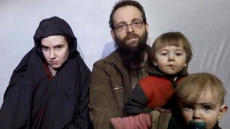TORONTO — A permanent Canadian resident currently stranded in Moscow says she has had her status revoked due to a clerical error and accuses the government of refusing to listen to her efforts to get it reinstated.
Julia Yakobi says the Aug. 11 decision has left her stranded in her native country without means of returning to the country she now considers home.
Yakobi travelled to Moscow in July with an expired permanent residency card, a move that Citizenship and Immigration Canada allows but does not recommend.
Yakobi applied for a travel document that would allow her to return to Canada, but was both denied the document and told she did not meet the criteria for permanent residency days before her scheduled flight home.
She says tax returns, cellphone records and residential rental agreements show that she has lived in Canada for years, but CIC's rejection letter said she had only spent 65 days in Canada since 2011 and therefore fell short of the ministry's residency requirements.
Yakobi says CIC has refused to even look at her supporting documentation and insists she must go through a lengthy appeal process to resolve what she believes to be a simple administrative error.
The ministry says Yakobi became a permanent resident in 2003 and has been issued two permanent residency cards and three travel documents since. It says she applied for a travel document on Aug. 8 because her permanent residency card expired in December.
"Based on the documentation she provided with her application and the information on file, the officer determined that she did not meet the residency requirement," the ministry said in an email, stating that Yakobi had only been in Canada for 65 days in the last five years.

The ministry said the officer considered Yakobi's documented dates of entry and exit, noting that her last documented entry to Canada was in June 2013, as well as an income tax slip it said did not support her claim to have worked full-time in Canada.
One of Yakobi's daughters, Nargis Hannah Yakobi, said the ministry's own information supports her mother's stance.
"The date of entry is in 2013, and the date of her exit was July 25, 2016, when she left for Moscow. How is that 65 days?" she said in an email. She also said her mother never claimed to work full time, and full-time work is not a requirement for permanent residency.
Yakobi said the saga has left her feeling isolated and anxious. She fears losing her jobs teaching Russian at various Toronto-area schools, holding on to the condo she has been renting for years, and returning to her two daughters and grandchild, who are all based in Ontario.
"I don't belong here any more. All my life is in Toronto," Yakobi said in a telephone interview from Moscow. "Everything is there. For the past several years, I built my life there."
Yakobi said she first came to Canada to flee an abusive relationship in 2003, bringing her two young daughters with her.
The warm welcome that greeted her and the collective willingness to help her destitute family instilled a profound fondness and gratitude for Canada and the people who live here, she said.
While one of Yakobi's daughters went on to secure Canadian citizenship, Yakobi herself remained in the country as a permanent resident. She was able to make multiple trips in and out of the country without incident over the years, but had stayed put since 2013, she said.

Yakobi's permanent residency card expired in December 2015, several months before she opted to return to Russia to seek medical advice and attend to some personal matters.
She and her family concede that travelling with out-of-date documentation was unwise, but CIC's own guidelines make such arrangements possible.
"If you have been in Canada at least once during the past 365 days, you are entitled to a travel document to enable your return to Canada," reads a letter in which Yakobi's request for such a document is declined based on residency requirements.
CIC guidelines state that a person must spend at least 730 days in Canada during the five years prior to applying for a travel document. Yakobi said she had been in the country for more than 1,200 days.
Yakobi felt she had adequate documentation to contest the ministry's findings. She collected five years worth of tax returns, a letter from her landlord indicating the length of her tenancy, cellphone records dating back to 2014, and letters from past employers indicating her ongoing presence in Canada.
But Yakobi said ministry processes made it impossible for her to present the documents or even indicate that there may be a problem with her file. Emails elicited automated form responses, phone calls ended in assurances that nothing could be done, and officials at the Canadian embassy in Moscow informed her that their services were available only to Canadian citizens.
Yakobi's letter said she can launch a formal appeal of the decision, a process she fears could take years.
Opting not to appeal, the letter states, would result in her being deemed "imadmissible to Canada as a permanent resident" and considered to have "lost" her status as a perment resident.
The ministry said that if Yakobi chooses to appeal, "she would be entitled to a travel document to allow her to return to Canada pending the outcome of an appeal."
Yakobi said she sincerely believes the issue to be a clerical error that will not impact her view of her adopted country. Her daughter, who became a citizen in 2010, said her mother's ordeal has soured her perception of Canada as a welcoming nation.
"We just cannot believe that our government would do this to someone who has been in this country for . . . years," Hannah Yakobi said. "Who has tried to build their family and life here, who has paid taxes diligently, who has followed all the rules and laws, and they wouldn't even look into it."

Hannah Yakobi said the experience has left her feeling saddened and let down, while her mother's feelings can best be described as confused.
"This is clearly, clearly a mistake," she said. "But why they don't want to correct this mistake fast so I can come back home? This is my main question, and I'm completely clueless."



